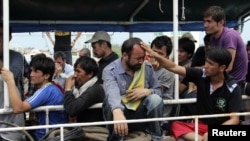JAKARTA —
This week the United Nations High Commission for Refugees held talks in Jakarta to try to develop a more coordinated, regional approach to the rising number of boat arrivals and deaths at sea.
Government representatives from Afghanistan, Australia, Indonesia, Thailand, Bangladesh, Burma and the United States gathered this week to discuss a growing, common problem.
Talks at the regional roundtable centered on improving search and rescue procedures and how to better process irregular boat arrivals.
UNHCR spokesperson Vivian Tan says the meeting, which was closed to journalists, was just the beginning of a regional response.
"Basically this meeting was meant to be the start of discussions between states in the region about the issue of irregular maritime movements," she said. "It was an attempt to get states to discuss the common challenges and agree on the need for regional cooperation. In terms of concrete proposals, we’re not there yet, but there was definitely a consensus on the need for more specific, more action driven responses to this common problem."
UNHCR says irregular migrations in the Asia Pacific recorded a huge increase in 2012.
Escalating conflict in Burma’s Rakhine state and protracted tensions in Pakistan, Iran and Afghanistan have seen a growing number of people fleeing on boats.
The United Nations says the Indian Ocean was particularly deadly in 2012, estimating that 500 people who boarded smugglers’ boats in the Bay of Bengal later died at sea.
In Australia, an attractive destination country, a record 17,000 people arrived by boat last year.
Because each country handles the irregular arrivals differently, where refugees end up can have a great bearing on their future.
Chris Lewa, director of the Rohingya advocacy group, Arakan Project, said, "I don’t know, but the way it is built at the moment is definitely not acceptable; that people arrive and some of them are pushed out to the sea, then they arrive in another country and they end up in detention. So these people need protection."
The UNHCR says the conclusions of this week’s meeting will be shared with the Bali Process members, a group focused on improving regional law enforcement coordination to prevent people smuggling and trafficking networks.
Government representatives from Afghanistan, Australia, Indonesia, Thailand, Bangladesh, Burma and the United States gathered this week to discuss a growing, common problem.
Talks at the regional roundtable centered on improving search and rescue procedures and how to better process irregular boat arrivals.
UNHCR spokesperson Vivian Tan says the meeting, which was closed to journalists, was just the beginning of a regional response.
"Basically this meeting was meant to be the start of discussions between states in the region about the issue of irregular maritime movements," she said. "It was an attempt to get states to discuss the common challenges and agree on the need for regional cooperation. In terms of concrete proposals, we’re not there yet, but there was definitely a consensus on the need for more specific, more action driven responses to this common problem."
UNHCR says irregular migrations in the Asia Pacific recorded a huge increase in 2012.
Escalating conflict in Burma’s Rakhine state and protracted tensions in Pakistan, Iran and Afghanistan have seen a growing number of people fleeing on boats.
The United Nations says the Indian Ocean was particularly deadly in 2012, estimating that 500 people who boarded smugglers’ boats in the Bay of Bengal later died at sea.
In Australia, an attractive destination country, a record 17,000 people arrived by boat last year.
Because each country handles the irregular arrivals differently, where refugees end up can have a great bearing on their future.
Chris Lewa, director of the Rohingya advocacy group, Arakan Project, said, "I don’t know, but the way it is built at the moment is definitely not acceptable; that people arrive and some of them are pushed out to the sea, then they arrive in another country and they end up in detention. So these people need protection."
The UNHCR says the conclusions of this week’s meeting will be shared with the Bali Process members, a group focused on improving regional law enforcement coordination to prevent people smuggling and trafficking networks.




